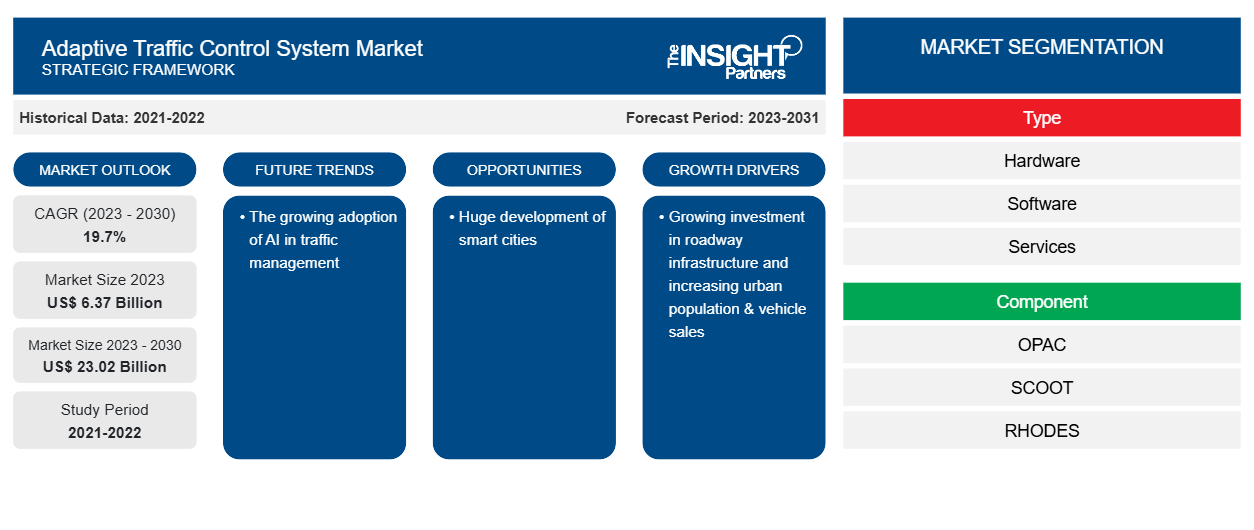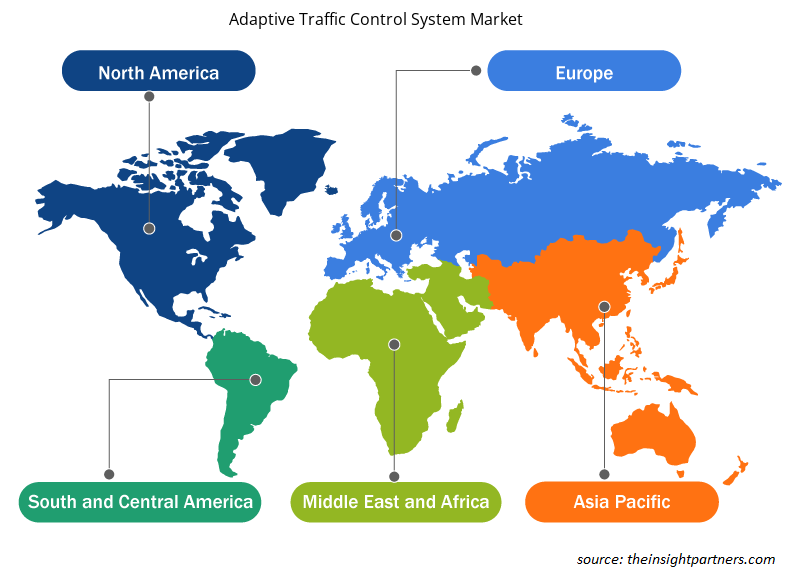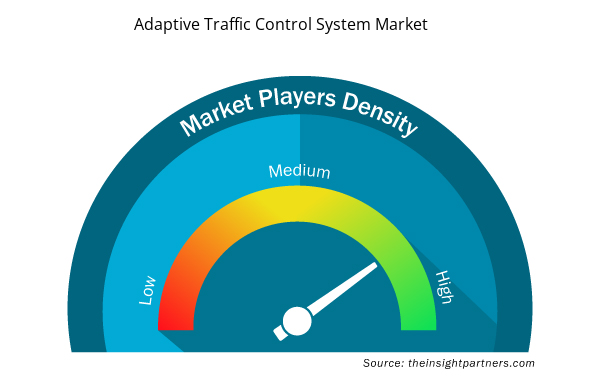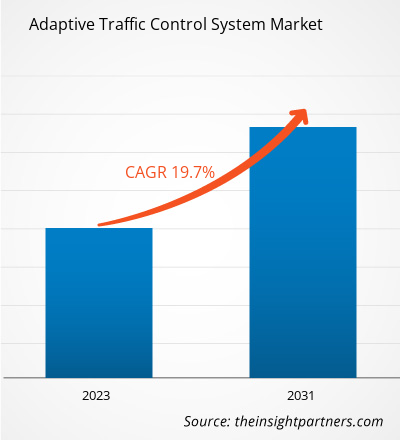The adaptive traffic control system market size is projected to reach US$ 23.02 billion by 2030 from US$ 6.37 billion in 2023. The market is expected to register a CAGR of 19.7% during 2023–2030. Growing adoption of AI in traffic management is likely to remain a key trend in the market.
Adaptive Traffic Control System Market Analysis
Over the past few years, the adaptive traffic control system market has witnessed significant growth owing to factors such as growing investment in roadway infrastructure and increasing urban population and vehicle sales. Huge development of smart cities to provide lucrative growth opportunities for the adaptive traffic control system market.
Adaptive Traffic Control System Market Overview
Adaptive Traffic Control System (ATCS) is a solution that enables cities to manage their traffic and pedestrian signals along with complex road networks to optimize traffic flow. Adaptive traffic control system adapts to real-time traffic patterns to optimize the traffic flow by dynamically changing the green split timings. Based on the volume of traffic at each intersection and the expected number of arrivals from nearby intersections, the ATCS algorithm continuously modifies the timing of the traffic signals. By gradually letting cars pass through green lights, it significantly shortens travel times and eases traffic by promoting smoother flow.
Customize This Report To Suit Your Requirement
You will get customization on any report - free of charge - including parts of this report, or country-level analysis, Excel Data pack, as well as avail great offers and discounts for start-ups & universities
Adaptive Traffic Control System Market: Strategic Insights

- Get Top Key Market Trends of this report.This FREE sample will include data analysis, ranging from market trends to estimates and forecasts.
You will get customization on any report - free of charge - including parts of this report, or country-level analysis, Excel Data pack, as well as avail great offers and discounts for start-ups & universities
Adaptive Traffic Control System Market: Strategic Insights

- Get Top Key Market Trends of this report.This FREE sample will include data analysis, ranging from market trends to estimates and forecasts.
Adaptive Traffic Control System Market Drivers and Opportunities
Growing Investment in Roadway Infrastructure to Favor Market
The demand for better transportation facilities, such as better road conditions, smooth traffic flow, and connectivity between different areas, is rising worldwide due to the increasing population. As a result, the government authorities of different countries are focusing on developing their road infrastructure. In June 2022, the government of China announced its plan to launch 120 new expressways and ordinary national and provincial highway projects, which will cover more than 3,600 km. A total amount of US$ 27.20 billion (182 billion yuan) will be allocated to these projects. Similarly, in March 2022, VINCI Highways announced that the expansion of the B247 road between Mühlhausen and Bad Langensalza in Germany had started. For the construction of this road, the government has approved an investment of ~US$ 545.61 million (EUR 500 million). Also, the government of Ontario announced an investment of ~US$ 3 billion to repair and expand provincial highways and bridges from April 2022 to March 2023. Almost US$ 1.7 billion was used in southern Ontario and around US$ 624 million in northern Ontario to repair and expand highways and bridges. Growing investments in roadway infrastructure raise the need to implement automated traffic control systems to improve traffic flow and enhance vehicular safety. Thus, the rising expenditure on infrastructure for passenger and driver safety bolsters the adaptive traffic control system market growth.
Growing Adoption of AI in Traffic Management
Road traffic management has undergone a radical transformation as a result of artificial intelligence's (AI) quick development. These days, artificial intelligence (AI) can accurately forecast and manage the movement of people, things, cars, and cargo at various locations along the transportation network. AI is not only giving citizens better services than previously, but it is also enabling safer travel times at times when roads are closed due to construction or other events and reducing the number of accidents by optimizing traffic patterns at intersections. Moreover, AI's capacity to handle and evaluate enormous volumes of data has made mass transit-like ride-sharing services effective.
Adaptive Traffic Control System Market Report Segmentation Analysis
Key segments that contributed to the derivation of the adaptive traffic control system market analysis are type, component and application.
- Based on the type, the adaptive traffic control system market is divided into hardware, software, and services. The hardware segment will hold a significant market share in 2022.
- By component, the market is segmented into OPAC, SCOOT, RHODES, and SCATS. The SCATS segment held the largest market share in 2022.
- In terms of application, the market is segmented into highways and urban (cities). The urban (cities) segment held the largest market share in 2022.
Adaptive Traffic Control System Market Share Analysis by Geography
The geographic scope of the adaptive traffic control system market report is mainly divided into five regions: North America, Asia Pacific, Europe, Middle East & Africa, and South & Central America.
Adaptive traffic control system is widely used in the UK, Asia, and Australia. Slightly less than 1% of signalized junctions in the US have adaptive signal control technologies installed. In addition to the potential expense of hardware, other obstacles, such as knowledge required to configure and maintain the system, the absence of active performance measurement, and misconceptions regarding the advantages of adaptive signal control technology may restrict the adoption of adaptive traffic control system in various countries.
Adaptive Traffic Control System Market Regional Insights
The regional trends and factors influencing the Adaptive Traffic Control System Market throughout the forecast period have been thoroughly explained by the analysts at Insight Partners. This section also discusses Adaptive Traffic Control System Market segments and geography across North America, Europe, Asia Pacific, Middle East and Africa, and South and Central America.

- Get the Regional Specific Data for Adaptive Traffic Control System Market
Adaptive Traffic Control System Market Report Scope
| Report Attribute | Details |
|---|---|
| Market size in 2023 | US$ 6.37 Billion |
| Market Size by 2030 | US$ 23.02 Billion |
| Global CAGR (2023 - 2030) | 19.7% |
| Historical Data | 2021-2022 |
| Forecast period | 2023-2031 |
| Segments Covered |
By Type
|
| Regions and Countries Covered | North America
|
| Market leaders and key company profiles |
Adaptive Traffic Control System Market Players Density: Understanding Its Impact on Business Dynamics
The Adaptive Traffic Control System Market is growing rapidly, driven by increasing end-user demand due to factors such as evolving consumer preferences, technological advancements, and greater awareness of the product's benefits. As demand rises, businesses are expanding their offerings, innovating to meet consumer needs, and capitalizing on emerging trends, which further fuels market growth.
Market players density refers to the distribution of firms or companies operating within a particular market or industry. It indicates how many competitors (market players) are present in a given market space relative to its size or total market value.
Major Companies operating in the Adaptive Traffic Control System Market are:
- Aldridge Traffic Controllers Pty Ltd
- Digicon SA
- EFKON India Pvt. Ltd.
- Efftronics Systems Pvt Ltd
- Kapsch TrafficCom AG
- Trafiksol ITS Technologies Pvt Ltd
Disclaimer: The companies listed above are not ranked in any particular order.

- Get the Adaptive Traffic Control System Market top key players overview
Adaptive Traffic Control System Market News and Recent Developments
The adaptive traffic control system market is evaluated by gathering qualitative and quantitative data post primary and secondary research, which includes important corporate publications, association data, and databases. A few of the developments in the adaptive traffic control system market are listed below:
- Yunex Traffic announced the launch of the Yutraffic Blade Advanced Traffic Controller Platform to the US market. The next-generation edge-computing controller has a dual-core processor, powerful enough for all the traffic control applications of today and ready for those of the future. (Source: Yunex Traffic, Press Release, April 2023)
- The Directorate of Urban Land Transport (DULT) has initiated the trial run for a new traffic signaling system at the Kensington Road and Murphy Road junction near Ulsoor. The system incorporates Japanese MODERATO (Management of Origin-Destination-Related Adaptation for Traffic Optimization) technology. (Source: THE HINDU BUREAU, Press Release, February 2024)
Adaptive Traffic Control System Market Report Coverage and Deliverables
The “Adaptive Traffic Control System Market Size and Forecast (2020–2030)” report provides a detailed analysis of the market covering below areas:
- Adaptive traffic control system market size and forecast at global, regional, and country levels for all the key market segments covered under the scope
- Adaptive traffic control system market trends, as well as market dynamics such as drivers, restraints, and key opportunities
- Detailed PEST/Porter’s Five Forces and SWOT analysis
- Adaptive traffic control system market analysis covering key market trends, global and regional framework, major players, regulations, and recent market developments
- Industry landscape and competition analysis covering market concentration, heat map analysis, prominent players, and recent developments for the adaptive traffic control system market
- Detailed company profiles
- Historical Analysis (2 Years), Base Year, Forecast (7 Years) with CAGR
- PEST and SWOT Analysis
- Market Size Value / Volume - Global, Regional, Country
- Industry and Competitive Landscape
- Excel Dataset


- Skin Graft Market
- Bioremediation Technology and Services Market
- Online Recruitment Market
- Rare Neurological Disease Treatment Market
- Piling Machines Market
- Aesthetic Medical Devices Market
- Energy Recovery Ventilator Market
- Explosion-Proof Equipment Market
- Medical Devices Market
- Small Molecule Drug Discovery Market

Report Coverage
Revenue forecast, Company Analysis, Industry landscape, Growth factors, and Trends

Segment Covered
Type, Component, and Application

Regional Scope
North America, Europe, Asia Pacific, Middle East & Africa, South & Central America

Country Scope
Argentina, Australia, Brazil, Canada, China, France, Germany, India, Italy, Japan, Russian Federation, Saudi Arabia, South Africa, South Korea, United Arab Emirates, United Kingdom, United States
Frequently Asked Questions
What is the expected CAGR of the adaptive traffic control system market?
The global adaptive traffic control system market is expected to grow at a CAGR of 19.7% during the forecast period 2023 - 2030.
What are the driving factors impacting the global adaptive traffic control system market?
Growing investment in roadway infrastructure and increasing urban population & vehicle sales are the major factors driving the adaptive traffic control system market.
What are the future trends of the adaptive traffic control system market?
The growing adoption of AI in traffic management is anticipated to play a significant role in the global adaptive traffic control system market in the coming years.
Which are the leading players operating in the adaptive traffic control system market?
The leading players operating in the adaptive traffic control system market are Aldridge Traffic Controllers Pty Ltd, Digicon SA, EFKON India Pvt. Ltd., Efftronics Systems Pvt Ltd, Kapsch TrafficCom AG, Trafiksol ITS Technologies Pvt Ltd, Swarco AG, Cubic Transportation Systems Inc, Johnson Controls International Plc, Vivacity Labs Ltd, Miovision Technologies Inc, Rhythm Engineering Inc, No Traffic, Kimley-Horn and Associates Inc, Q-Free ASA, and Econolite Group Inc.
What would be the estimated value of the adaptive traffic control system market by 2030?
The adaptive traffic control system market size is projected to reach US$ 23.02 billion by 2030.
Which region dominated the adaptive traffic control system market in 2022?
North America is expected to dominate the adaptive traffic control system market with the highest market share in 2022.
Trends and growth analysis reports related to Electronics and Semiconductor : READ MORE..
The List of Companies - Adaptive Traffic Control System Market
- Aldridge Traffic Controllers Pty Ltd
- Cubic Transportation Systems Inc
- Digicon SA
- Econolite Group Inc
- Efftronics Systems Pvt Ltd
- EFKON India Pvt. Ltd.
- Johnson Controls International Plc
- Kapsch TrafficCom AG
- Kimley-Horn and Associates Inc
- Miovision Technologies Inc
- No Traffic
- Q-Free ASA
- Rhythm Engineering Inc
- Swarco AG
- Trafiksol ITS Technologies Pvt Ltd
- Vivacity Labs Ltd

 Get Free Sample For
Get Free Sample For